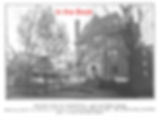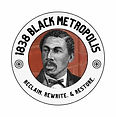Black people were not included in some older popular Philly history books
- Michiko Quinones
- Oct 25, 2023
- 3 min read
Updated: Jun 6, 2025
Lots of students are looking to use primary sources in their papers starting as early as 6th grade. But some primary sources have written Black people out completely.
"Primary sources" means information from first hand accounts written soon after something happened. This can include newspapers accounts, diaries, and published histories.
I have come across two public histories of Philadelphia that do not include any Black people or Black infrastructure at all.
Henry Simpson's Lives of Eminent Philadelphians Now Deceased written in 1859 does not include any Black people.
By 1859 James Forten, Richard Allen and Absalom Jones had already passed away and should have qualified to be in the book.
Learn about them in our timeline here: Black Metropolis 101 Timelines.
James Forten, as we have seen from the recent exhibit on his life, was well...exhibit worthy. Revolutionary war hero, father of a dynasty of abolition leaders, one of the richest men in Philadelphia (top 3) in 1810. He should've been in the book.

Richard Allen founded a major religious denomination that by 1859 had spread world wide. A Richard Allen contemporary, a white man named Joseph Smith, also started a major religious denomination around the same time and his works are treated like historical treasures (see the price on this Book of Mormon). My guess is that if Joseph Smith was a Philadelphian, he would have been in the book.
For real, Richard Allen should've been in the book.
Absalom Jones was founder of the Free Africa Society, and St. Thomas African Episcopal church. Sure he was more of a local hero but still noteworthy enough for the book. I mean if. Rev. Phillip Mayer can be in the book - he was "beloved by his congregation" but was not a founder of a church - then surely Rev. Jones should be in the book too.
Philadelphia and Notable Philadelphians by Moses King written in 1902 does not include any Black people or infrastructure.
It was probably meant to be an exhaustive visual history of prominent people and all the built infrastructure (churches, public buildings, industrial buildings, office buildings) in Philadelphia.
By this time, Mother Bethel AME was on it's fourth building.

Mother Bethel AME is equal in size and stature to the church below that made it in the book.

.
And Lombard Central was up and running, an active and influential congregation at the time the book was written.

But St. George's, a white denomination of about the same size, is in the book.

Douglass Hospital was up and active on Lombard Street when the book was published.

And it was equal in stature to this hospital that made it in the book.

Notable Black people not included in King's book include the folks mentioned above but also by this time Jacob C. White Jr. who was principal of Vaux Public School and founder of the Pythians Baseball club and also a leader in the Pennsylvania Equal Rights League,. professor at the Institute for Colored Youth, member of the Banneker Institute....I could go on.
He's not in the book.

But this guy, the cashier from the Merchants National Bank, is in the book. .

Another example, Christopher James Perry, Sr. was the founder of the Philadelphia Tribune which was running then and still running today.

While the the General Manager of the Philadelphia Times is in the book.

This is race based historical erasure and is social injustice within the documentation of our collective histories. You may have heard of the term "white-washing" and this is a clear example. White-washing means the clearing out of non-white, and usually non-male people from historical narratives.
Be careful of the primary sources you use because they will have you thinking that Black people weren't even here in Philadelphia.
Our mission is all about surfacing the true history and ensuring that our histories are written into all Philadelphia histories.
Make sure that your children know our Philadelphia Black History timelines so that if they ever come across these books or those like them, they'll know the truth.
6/6/25 Update
Found another one. Byways and boulevards in and about historic Philadelphia, by Francis Burke Brandt and Henry Volkmar Gummer, 1925, has over 10 pages of 'Ancient' churches and no mention of Mother Bethel AME Church, St. Thomas African Episcopal Church or Mother Zoar - churches that all existed prior to 1796.





